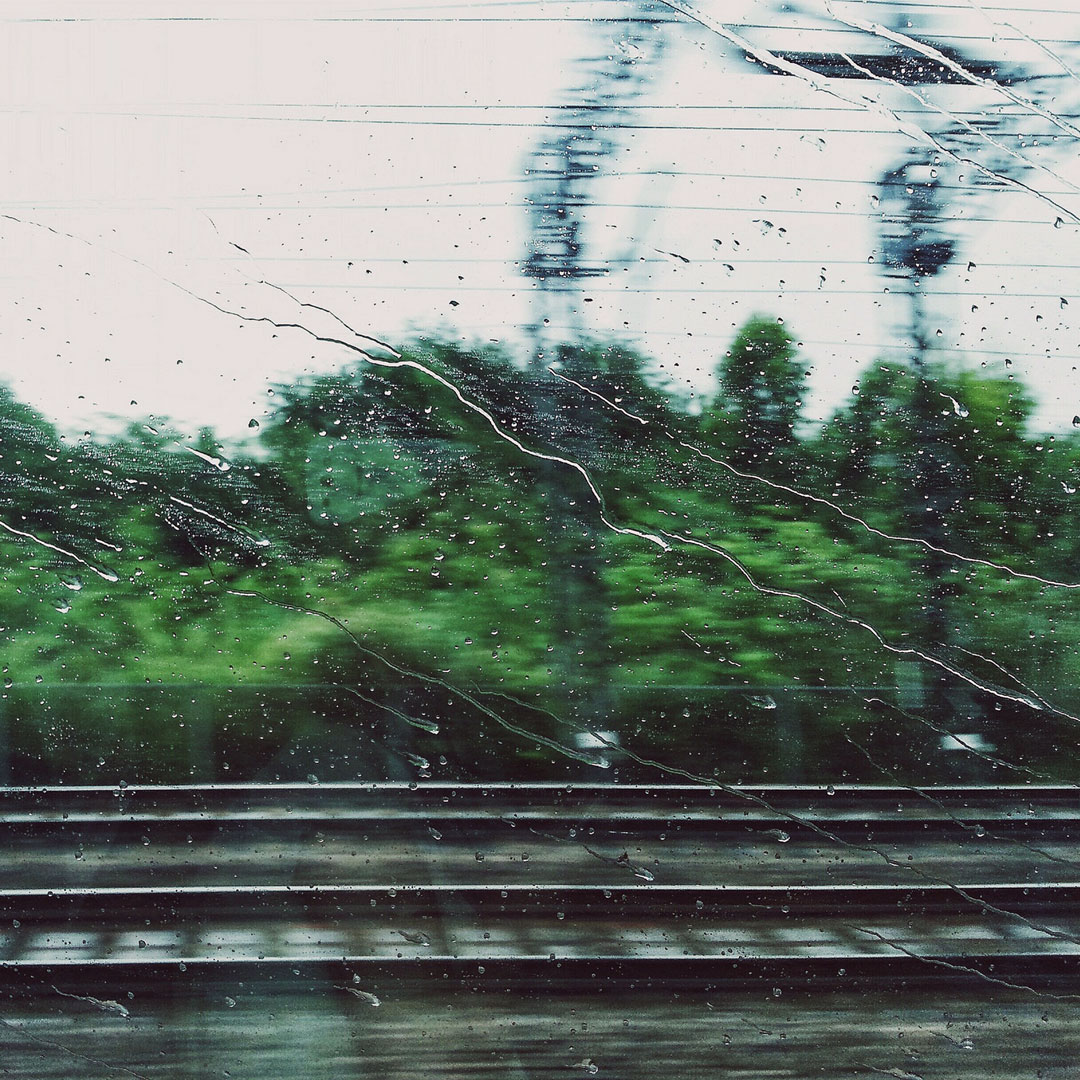Pull/Draw
HOW IT BEGAN: I TURNED FOURTEEN IN THE YEAR OF THE DOG.
My father gave me the devotional book that birthday, a hardbound edition with a cover I pulled off and left on my bed or on the floor of my room. I stepped on Little Visits With God every other day, my sneakers dipping divots in the slick paper.
Devotionals for mornings and for evenings, labeled for all the days of the year—each set only a page and a half long, short enough for younger readers, but still solid gospel for adults. I read one alone over breakfast, eating spoonfuls of instant strawberry oatmeal between paragraphs, and the other was read aloud at dinner while I doled out my mother’s mashed potatoes or spooned green beans onto our plates.
After the reading:
What does God want you to do?
How can it help you serve?
Let’s pray about this, together.
I wasn’t homeschooled, but I did take my Bible with me everywhere I went. In one of the devotionals, a boy had the opportunity to minister to a non-believer and lost out because he’d forgotten the necessary scripture. There was a black and white sketch of the non-believer being killed in a car accident the very next day. The devotional was called “The Missed Opportunity.”
At night, the pressure of the house sank into my skin. The cadence of my mother’s voice, never raised, soaked through the walls of my bedroom. There was no autonomy to my body, I could feel my mother in me and she could feel her mother in her and all these women sat inside each other like nesting dolls. All smaller and smaller, until the oldest of us finally disappeared and was replaced by another copy, the new one swallowing up the entire set.
In another devotional, a brother and sister play with a train set while their mother’s away at the grocery store, even though she’s told them not to. The model train runs on rubbing alcohol. When the little boy tries to start the engine, a fire lights the rug and quickly spreads to the curtains and beyond, licking red-orange up the wallpaper. As the little girl tries to douse the flames with a wet kitchen rag, her hair catches fire. Her brother must put her out with his own shirt. She is badly burned; badly scarred. The devotional is called “God’s Holy Wrath.”
Its moral, my mother said, was to listen to good authority.
American Freight Service
We strode tall through the corn. No dodging stalks, no zigzag diversions from our chosen path. We were Davidsons: we walked steady and sure-footed and single file. We blazed as pioneers, and we struggled just as dearly.
“We’re close,” my mother said. “Very close.”
It was barely morning, but the sun was in prime position; a ripe egg yolk perched at the cusp of land and sky. I followed my mother, though she’d kept me in the dark about our plans. I knew better than to ask questions that wouldn’t get answers. Instead, I put my feet in her tread marks, fashioned my loping gait after her swaying hips. My mother was five foot even in stocking feet, but she strode like a colossus in patent leather stilettos. The heels of her shoes made deep gouges in the earth, punctured holes of black like knife blades.
My brother, Peter, lagged several steps behind. It was hard work to corral him through greenery that grew higher than our heads. His eyes still held that sleepy edge that traveled to his mouth. It was turned downward into the deep-set pout of all five-year-olds when they haven’t eaten.
“I’m hungry.”
“Later.” I pulled against his deadweight. “We’ll have an early lunch.”
We were all hungry. Mother had woken us long before dawn, shoved our limp appendages into stiff and dirty clothes from the day before. Now she carried our things in each hand. All of our worldly goods stuffed into two cheap suitcases that banged along at her side.
Not far away came the low, lonely call of a train.
“Hurry up.” My mother’s pace had nearly doubled, and the blue feather on her hat bobbed furiously. “We can’t be late.”
I struggled to keep up. I had on my new coat, fawn-colored and plush. It was a belated birthday gift from the grandparents who I’d only just met that month; the kind of people who woke at dawn and worked their farm until the sun dropped below the top rail of the fence. They were nothing like my pretty mother, whose nails were clean white moons. My mother had hands that played the piano; pale, slender fingers that held china cups and plucked embroidery thread.
My grandmother would be up and missing us soon. She’d promised us breakfast. Salty, thick cut bacon from the hogs slaughtered out back of the house. I thought of stacked pancakes as sweat dripped down my forehead like melted butter.
The train sounded again, much closer. We pushed relentlessly against a wave of green, but the tenacity of the stalks was no match for my mother. I imagined the corn was the Red Sea parting for Moses, and that my mother was the strong hand of God, bending everything to her will.
We burst through the corn at the side of the tracks. At the edge of the horizon, a dark blot puffed along steadily. We were about a mile away from the train station. I dizzily wondered why my mother would have brought us here and not just waited for my grandfather to drive us into town. We could have all piled into his pickup. We could have stayed an extra day at their farm, playing with the puppies in the barn—darling dogs mottled brown with hair the texture of chicken fluff. They howled and yipped for affection, following anyone bigger than them; like Peter, like me.
“Almost there.”
“Where?”
“Here.”
My mother stopped at the edge of the green that led out to the bare silt black of the scorched dirt.
We sweltered. She kneeled in front of us in her green travel skirt, knees pressed against the earth. Her face was pink and white in the heat, small tendrils of yellow hair curling up at her ears. She clasped both of our hands – hers felt cool against my hot palms.
“We’re going to hop the train.”
Riding Sleeper
Only once had she gone anywhere alone.
When she was eighteen, she’d taken a train up North for a funeral. It was for a cousin twice removed, a woman she’d never met, but she was excited to travel so far from home. In preparation for the trip, her friends talked her into reserving a private compartment from the railroad company; what was called a sleeper car. She envisioned veiled hats and white gloves and cut-glass cheval mirrors straight out of black and white movies. Her mother bought dipped carnations and made a corsage for her slender wrist. She’d smiled and touted herself Lauren Bacall, all cool grace, and long legs.
But when her brother dropped her at the station, the depot was musty and grit-covered. A fine layer of silt covered the train, making the Amtrak look as if it had ridden through a dust storm. Inside her personal compartment, she couldn’t stretch out both arms without smacking into a wall.
“Where’s my bathroom?” she’d asked after several tense moments. The conductor folded up the end of a plasticized cot. Underneath was a metal toilet bowl: shiny, clinical.
“And this is where I sleep?”
“It’s efficient.”
He pointed to a stack of linens set on a chair that folded out from the wall. There was a small fleece blanket curled on top that looked like it belonged on an airplane.
Nothing could be done; she’d bought a non-refundable ticket. She attempted to settle into the room, a space so small she felt caged, more animal than the howling dogs crated in a nearby storage compartment. She read her Bible for a while, from Ruth and the Psalms, but the perpetual swaying upset her stomach and she put the book away. Instead, she stared out the window at the scenery that ran past like leaking watercolors – some blues and greens, but mostly browns. Her stomach growled, but she was too embarrassed to try dining in the club car with the other passengers. They all wore jeans and sweaters, making the outfit she’d picked out look silly and pretentious. She nibbled on stale crackers dug from her purse and drank water from the tiny corner sink, paying penance for her hubris.
In the middle of the night, while the train lurched from side to side on its slow ascent up the coast, she’d woken from a dream about insistent running water. A dog yelped furiously, a piercing cry that sounded like a young child crying for milk. In the dark, she fumbled with her cot, scared that she might wet herself before she could fold up her bedding. As she’d crouched above the metal lip of her makeshift bathroom, she’d clutched her pillow and wondered why she’d ever left home in the first place.
If anyone ever asked, she said riding that train resembled her adult life. She still started each morning with her head on the commode. When her mother heard that story, she’d said don’t be vulgar; this is probably why you’re not married.
Rolling Stock
Out on the porch, the three broke open their palms and compared lifelines. It was dark and there was no moon; the lines on their skin converged into the matte gray of ancient cardboard. Sarah held up the knife. It was Swiss and held four blades, a toothpick, and a small pair of scissors. She’d gotten it as a birthday gift from her brother Paul, who sucked Stella from the bottle as he slurred his way through the opening line of Carmina Burana, over and over, to Bridgit.
“O fortuna,” he sang into Bridgit’s hair. “O fortuna.”
The hair was a fourth person on the porch, its size shading into a Siamese twin. Bridgit took his beer and drained the last inch. “Is that it?”
“Of the beer or the song?”
“Both. Neither.”
Opening the largest blade required fingernails that Sarah didn’t have. She passed it off to Paul who handed it to Bridgit, who leaned back on her haunches and let the light shining from inside the house guide her eyes.
“This one?”
“No, the one beside it.”
Back in Sarah’s hand, the knife was warmed over from touching their skin. She was buzzed from the beer and from the smoke, which still wreathed them and clouded puffs from the nub of joint that lay abandoned between their feet.
“How’s this work?” Paul pulled at a curl of cloudy hair and let it bounce before pulling at another. Bridgit slapped his hand.
“Just slice a line. Press hard, the blades are dull.” Sarah shouted this over the squealing sound of an oncoming train; the house was set less than fifty feet from the tracks.
“What?”
“Dull,” Sarah repeated, hand cupped around her mouth. “Very dull.”
Loud music leaked through the door. It opened an inch and then slammed closed again, letting out the heavy scent of garlic from leftover chicken wings. This was their party, what Paul coined their Grief Gathering. Their mother had been dead over a month, but it felt like longer.
Sarah dug the knife into the divot of her lifeline and pulled toward her heart with medium speed. There was pressure and then nothing. When she looked again, the line had blossomed dark in the pit of her cupped palm. She passed the knife to Paul, who handed it to Bridgit, who sliced a thin stroke along her own palm and then performed the operation on Paul, who didn’t watch but looked back inside through the window.
“Now what?”
“Put out your hand. It’s ritual.”
Shadows danced through the window as the music dialed down into bass notes. It was after midnight, and everyone had slipped into a slow grind. Sarah’s palm leaked steadily. She couldn’t see it, but she felt each drop hanging off her middle finger before falling to the porch. She reached for Paul, who reached for Bridgit. Their three injured hands slid together and mixed liquid as if sharing residual lotion.
It felt like nothing. It felt like her feet were sinking through the floor.
Someone opened the door again. People stumbled outside, leaning over the railing to smoke their cigarettes. A man Sarah didn’t know asked to borrow a lighter, and Paul pulled his hand away to dig through his jean pocket.
Sarah didn’t say we’re connected now, forever or you can never leave me or let’s stay caught in this moment or even I’ll be right back because she didn’t know if she would be. Her palm radiated heat from where she’d cut it, but mostly from where the blood had mingled. Each of her fingers owned a separate pulse.
Creeping through the front door, she slid along the wall where Bridgit had projected an image of a bee pollinating a bright purple flower. Her palm left a trail that marked her path, staining the white paint. She avoided the bodies crunched together on the makeshift dance floor and took the dwindling roll of paper towels next to the tray of wings, still filled with grease and halved cloves of garlic.
Now out through the back door, into the backyard. The smell was like Christmas. There was a fire pit going, and dark smoke waved in one direction and then another. The wind couldn’t decide where to take it, but someone had piled cardboard on the top of the stack and the ashes landed in people’s hair and on their clothes. A dog ran around the group, circling and performing figure eights between their legs. Sparks flew from the addition of a fresh log.
A girl yelled: “Shit, my new shirt! Shit!”
Her mother had loved silk scarves and cauliflower and romance novels. Her mother had taught her the Fruits of the Spirit and how to clean rust from carpet fibers and which Beatles album you could play backward to hear Satan’s voice.
The White Album, Sarah. Her mother smoked every day, almost as much as Paul. Listen; can you hear him say I AM THE DEVIL?
Trains fled past every twenty minutes. How the Earth shook! Sarah took a beer from one friend and then another from a stranger. They tasted the same, though one came in a can and the other from a sweaty brown bottle. She wrapped her slick hand in paper towels until she’d successfully mummified herself; bandaged until the heartbeat in her fingers quieted to timid thumps.
Walking back alongside the wooden fence, she came to a place where she could slip through a gap. She leaned back against the mildewed wood and watched moths fly up from the wet grass. The stink of dog shit was on her shoe. She put the empty can of beer on the track and waited for the next train to pass.
Kristen Arnett is a queer fiction and essay writer. She won the 2017 Coil Book Award for her debut short fiction collection, Felt in the Jaw, and was awarded Ninth Letter’s 2015 Literary Award in Fiction. She’s a columnist for Literary Hub and her work has either appeared or is upcoming at North American Review, The Normal School, Gulf Coast, TriQuarterly, Guernica, Electric Literature, Volume 1 Brooklyn, Bennington Review, Tin House Flash Fridays/The Guardian, Salon, The Rumpus, and elsewhere. Her debut novel, Mostly Dead Things, will be published by Tin House Books in Summer 2019. You can find her on twitter here: @Kristen_Arnett
Get this story in print!
“Engineering in Four Cars” originally appeared in Bridge Eight Literary Magazine Iss. 3
GO TO ISSUELike what you’re reading? Get new stories sent to your inbox every Monday.
Drop your email below to start >>>



